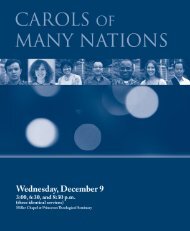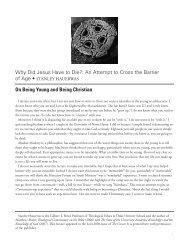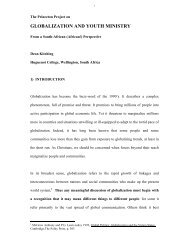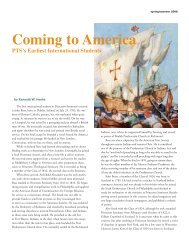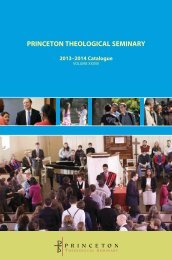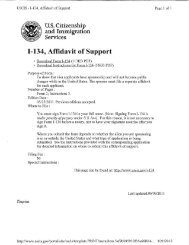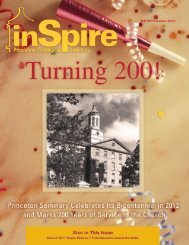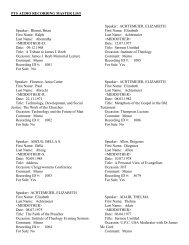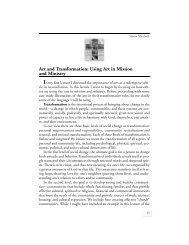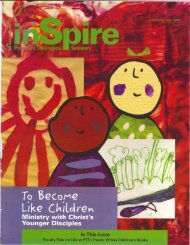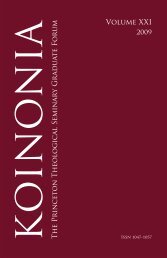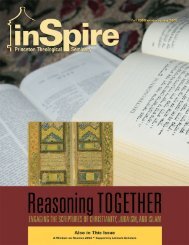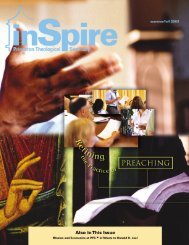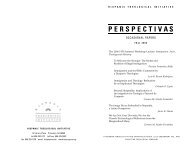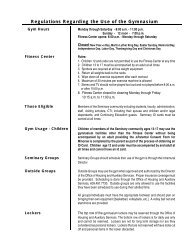Class notes - Princeton Theological Seminary
Class notes - Princeton Theological Seminary
Class notes - Princeton Theological Seminary
You also want an ePaper? Increase the reach of your titles
YUMPU automatically turns print PDFs into web optimized ePapers that Google loves.
fall 1997<br />
ormation<br />
Nurtures Sc<br />
tish and American<br />
Clergy<br />
"We ministers in the Church of Scotland<br />
have been living on very thin gruel," says<br />
PTS alumnus Nigel Robb ('79M, '89M),<br />
referring to the lack of serious continuing<br />
education for pastors in his denomination.<br />
"Other professions in Britain have been<br />
much more aware than the church of the<br />
need for people to be updated and supported<br />
in their professions." As the first director<br />
of educational services for the Church<br />
of Scotland's Board of Ministry, Robb is<br />
in a position to help change that.<br />
Beginning in 1998, the Church of<br />
Scotland will provide every parish minister<br />
(1200 of the denomination's 1300 clergy)<br />
who has served for five or more years a total<br />
of two weeks and up to 250 pounds (about<br />
$425 U.S. dollars) annually for continuing<br />
education. Or, as Board of Ministry convenor<br />
George Whyte (who spent several<br />
weeks doing his own continuing education<br />
at <strong>Princeton</strong> last summer) calls it, "ministry<br />
development. "<br />
This is the first time ministers in the<br />
Church of Scotland have been guaranteed<br />
continuing education as a part of their calls.<br />
The Board of Ministry will administer the<br />
new policy, which includes the option of<br />
banking some or all of the time for up to<br />
seven years so that a minister may take a sabbatical<br />
of fourteen weeks, with the General<br />
Assembly paying to supply his or her pulpit.<br />
Where will these pastors find continuing<br />
education events to attend? <strong>Princeton</strong><br />
<strong>Seminary</strong> intends to provide part of the<br />
answer.<br />
This past summer <strong>Princeton</strong> and St.<br />
Mary's College of St. Andrews University<br />
held their first Joint Institute of Theology for<br />
pastors from both sides of the Atlantic. Robb<br />
was the Institute's Scottish director; PTS's<br />
Dean of Continuing Education Joyce Tucker<br />
was the American director.<br />
by Barbara A. Chaapel<br />
"I got on the plane to Scotland in June<br />
as a sort of leap of faith," says Tucker. "There<br />
were a lot of administrative<br />
snafus in planning<br />
this Institute<br />
across an ocean, and<br />
I wasn't sure just how it would all work out."<br />
She need not have worried.<br />
For two weeks,<br />
sixty-six Americans, thirty-three Scots, and<br />
two Irish pastors enjoyed lectures by faculty<br />
from both sponsoring institutions (Nora<br />
Tubbs Tisdale and Patrick Miller were PTS's<br />
contributions), worshipped together in<br />
St. Salvaror's Chapel (dating from 1410),<br />
and discussed theology each evening in the<br />
pubs of St. Andrews.<br />
"The Institute was a spiritual experience<br />
for me," says Tucker, "as if we had antennae<br />
alert to God's presence there. We were in<br />
St. Andrews during the 1400th anniversary<br />
of the death of St. Columba,<br />
of that anniversary<br />
and the spirit<br />
was woven through<br />
the Institute. [Columba brought Christianity<br />
to Scotland in 563 when he left his native<br />
Ireland to build a mission on the island<br />
ofIona that became the center of Celtic<br />
Christianity]. We had a historian from<br />
Aberdeen who talked about Columba's story,<br />
a story filled with both myth and history, as<br />
one of the evening programs. We sang songs<br />
from the liturgy of the Iona community. We<br />
worshipped one afternoon in the ruins of the<br />
old St. Andrews cathedral, demolished by<br />
Knox's followers during the Reformation."<br />
Knox is, of course, one of the reasons<br />
<strong>Princeton</strong> has ties with Scotland.<br />
Born near Edinburgh and educated<br />
at St. Andrews, the reformer was ordained<br />
as a Catholic priest in 1536. The year 1547<br />
found him at St. Andrews, where he purportedly<br />
received the call to preach the<br />
Gospel as a Protestant. He spent the next<br />
decade in Geneva studying under John<br />
Calvin and imported the Presbyterian form<br />
of government to his native Scotland.<br />
A century<br />
later, settlers in the middle<br />
colonies in America, some of whom had<br />
immigrated as the result of English persecution<br />
of SCOtsPresbyterians under Charles II,<br />
requested a Presbyterian minister from the<br />
homeland.<br />
In the late 1600s, a Scots-Irish<br />
minister named Francis Makemie answered<br />
the call and established a Presbyterian church<br />
in Accomack County, Maryland, and later<br />
the first presbytery<br />
in America.<br />
These same first- and second-generation<br />
Scots founded <strong>Princeton</strong> University and later<br />
<strong>Princeton</strong><br />
<strong>Seminary</strong>.<br />
As the Church of Scotland's roots run<br />
through Geneva, the roots of the Presbyterian<br />
Church in the United States run through<br />
Edinburgh and St. Andrews. Knox's Book of<br />
Discipline is the foundation for the PC(USA)'s<br />
constitution,<br />
which he authored,<br />
and the Scots Confession,<br />
is one of the confessions<br />
by which American Presbyterians are guided.<br />
Now the "mother church" is turning to<br />
the "daughter" to continue a theological conversation<br />
that began centuries ago.<br />
"Scotland has accepted a fairly static<br />
model of church," says Robb. "I think this<br />
is because a big part of our mission is to provide<br />
the ordinances<br />
of Scotland."<br />
Whyte,<br />
of religion for every inch<br />
who is the pastor of Colinton<br />
Parish Church in Edinburgh (where PTS<br />
alumna Easter Smart is a full-time assistant<br />
pastor), explains: "In Scotland we have<br />
parishes, not congregations. A minister serves<br />
as a sort of chaplain<br />
For example, parish ministers<br />
funerals and weddings<br />
to the community.<br />
or not the people are members<br />
do all of the<br />
in the parish, whether<br />
of the<br />
church. That can mean as many as 120<br />
funerals a year, or six or seven a week."<br />
The expectations<br />
of this model of ministry<br />
means Scottish pastors have had little<br />
time to develop their skills in preaching,<br />
10. inSpire



